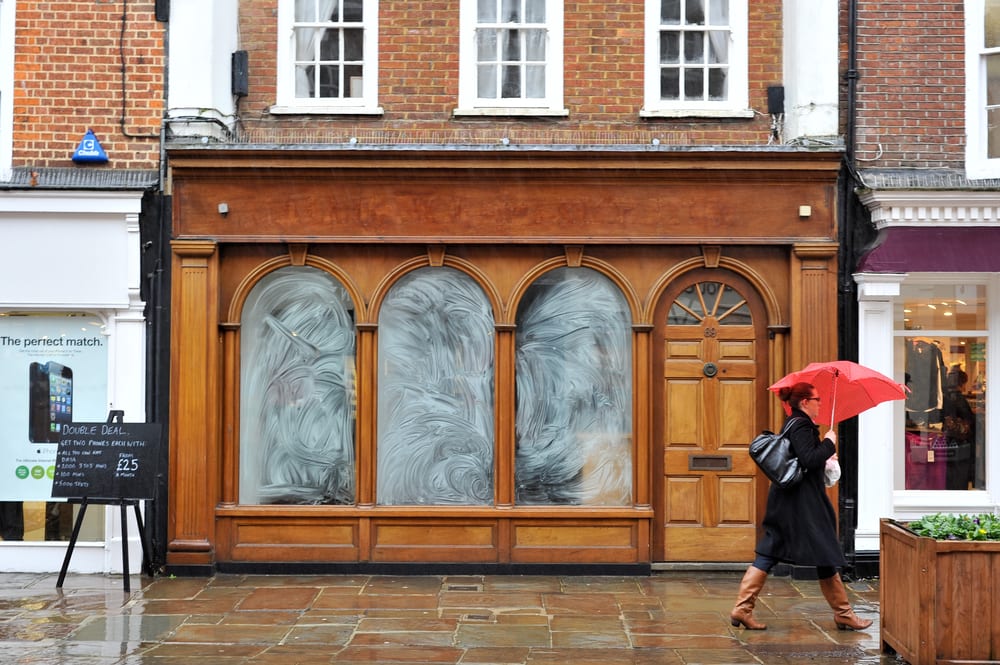Business premises can make or break your business. I can say that from personal experience. Our current showroom takes pride of place on Henley-on-Thames’ high street, which receives a large amount of footfall. The façade is largely glass, and our carefully-designed window displays draw in flocks of customers – particularly on Saturday mornings.
But this wasn’t always the case. When we first began trading in Henley, we couldn’t afford to rent premises directly on the high street. We instead took ownership of a first-floor workshop, in a courtyard just off the main road.
Following some successful local projects and advertisements, the interior design side of the business rapidly began to grow. But our showroom received a frustratingly low amount of passing trade, and we soon found ourselves with excess stock.
By 2012, we had raised enough capital to be able to rent premises on the high street. By happy coincidence, the perfect shop became available just as we began our search. Following a frantic period of stock-finding and decoration, our new physical store opened for business.
The new location made a huge difference in profit from day one, with hundreds of people stopping by to browse our products. Our retail business has now expanded into a successful operation, and our original premises are now used to store larger pieces of merchandise.
Whether you’re relocating due to expansion, or opening your first company, here are 4 fundamental keys to choosing the right business premises.
Financial Concerns
Your choice of business premises will largely be driven by financial concerns. Indeed, your first major decision will be whether to rent or buy the premises. In the short term, renting is the cheapest option, as you won’t need to produce a hefty deposit. It can make sense to start with a temporary measure to test the business idea out, like a pop-up shop or a temporary building.
If you start to rent, monthly payments can soon add up. If you intend to stay in one location for many years, you should consider buying your own premises.
Your rent or mortgage payment will not be your only monthly bill – various overhead costs will inevitably drive up your payments. Before making a final decision, you should fully investigate the property’s utility rates, along with local business taxes, insurance premiums, and security costs.
Get the Look
You will undoubtedly need to change certain aspects of your chosen property’s appearance. However, this should be largely cosmetic – avoid having to make significant changes if possible. Check that the building is presentable from the outside. If your business looks shabby and run-down, it could potentially deter customers.
Appearances are always important in business. However, your property must also be able to meet your specific requirements. Does the building have all of the facilities you’ll need? Consider the needs of your staff and customers, such as bathrooms and kitchen areas.
You should also assess whether the building is large enough for your purposes. When considering your space requirements, it’s important to look ahead. If you’re planning to expand your business, try to choose a property which can absorb your growth.
Stay on the Right Side of the Law
There are a number of legal issues to consider when choosing a new business location. There are a variety of commercial licenses, and you should always check that your chosen premises hold the licence you need.
You also need to make sure the building complies with all legal regulations – from fire and ventilation, to heating and space.
There could also be local restrictions affecting your chosen property. Always research these thoroughly before making a final decision. Are there any waste disposal issues? Will your suppliers be able to unload products easily, or are there local time constraints?
Location, Location, Location
Your ideal location will depend entirely on the nature of your business. If you rely on passing trade, you should look for premises in an area of high footfall. However, companies which need a lot of storage space should consider an out-of-town location.
Business premises are generally more expensive in the town centre. However, if you opt for a cheaper location, bear in mind the proximity of public transport routes. You should also make sure there are plenty of parking spaces for customers, employees, and delivery trucks.
When choosing new business premises, it can be useful to ask other entrepreneurs for their experience and advice and seek professional advice from specialist estate agents and property lawyers. Some other resources such as ownup can be very useful. However, you should base your final decision solely on your own circumstances.
The location of your enterprise can determine whether you succeed or fail, so do your research, take your time, and make sure it is the right choice. To make better-informed decisions, you can make use of web-based mapping technologies like Maptive. With this software, you can use the drive time radius tool in conjunction with other tools in its suite to quickly identify opportunities and make informed choices about where to best set up your business.
This post was written by Anne Haimes of AnneHaimesInteriors.co.uk, a successful Oxfordshire based interior design business.

